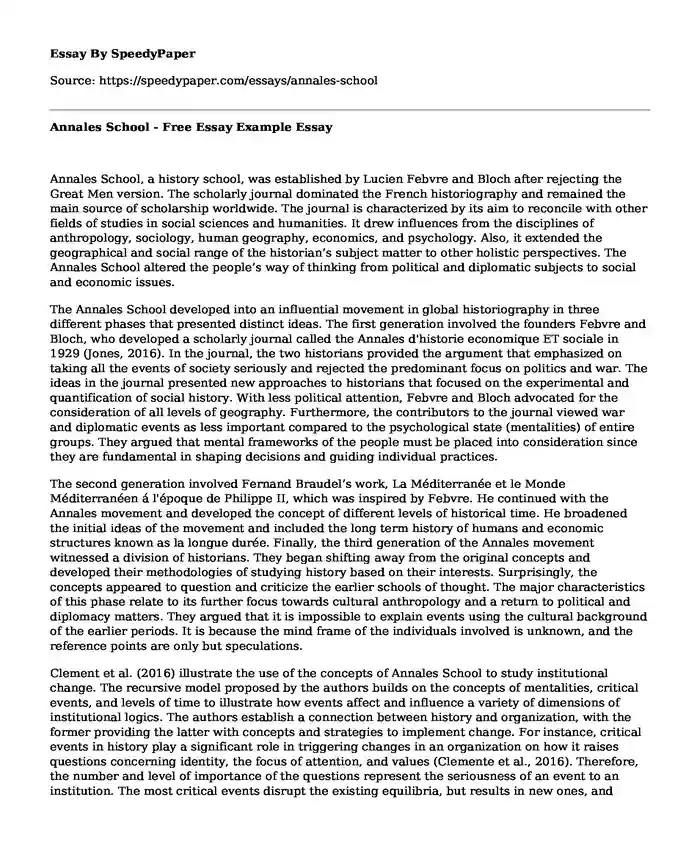
| Type of paper: | Essay |
| Categories: | Media Social change Social issue |
| Pages: | 3 |
| Wordcount: | 626 words |
Annales School, a history school, was established by Lucien Febvre and Bloch after rejecting the Great Men version. The scholarly journal dominated the French historiography and remained the main source of scholarship worldwide. The journal is characterized by its aim to reconcile with other fields of studies in social sciences and humanities. It drew influences from the disciplines of anthropology, sociology, human geography, economics, and psychology. Also, it extended the geographical and social range of the historian’s subject matter to other holistic perspectives. The Annales School altered the people’s way of thinking from political and diplomatic subjects to social and economic issues.
The Annales School developed into an influential movement in global historiography in three different phases that presented distinct ideas. The first generation involved the founders Febvre and Bloch, who developed a scholarly journal called the Annales d'historie economique ET sociale in 1929 (Jones, 2016). In the journal, the two historians provided the argument that emphasized on taking all the events of society seriously and rejected the predominant focus on politics and war. The ideas in the journal presented new approaches to historians that focused on the experimental and quantification of social history. With less political attention, Febvre and Bloch advocated for the consideration of all levels of geography. Furthermore, the contributors to the journal viewed war and diplomatic events as less important compared to the psychological state (mentalities) of entire groups. They argued that mental frameworks of the people must be placed into consideration since they are fundamental in shaping decisions and guiding individual practices.
The second generation involved Fernand Braudel’s work, La Méditerranée et le Monde Méditerranéen á l'époque de Philippe II, which was inspired by Febvre. He continued with the Annales movement and developed the concept of different levels of historical time. He broadened the initial ideas of the movement and included the long term history of humans and economic structures known as la longue durée. Finally, the third generation of the Annales movement witnessed a division of historians. They began shifting away from the original concepts and developed their methodologies of studying history based on their interests. Surprisingly, the concepts appeared to question and criticize the earlier schools of thought. The major characteristics of this phase relate to its further focus towards cultural anthropology and a return to political and diplomacy matters. They argued that it is impossible to explain events using the cultural background of the earlier periods. It is because the mind frame of the individuals involved is unknown, and the reference points are only but speculations.
Clement et al. (2016) illustrate the use of the concepts of Annales School to study institutional change. The recursive model proposed by the authors builds on the concepts of mentalities, critical events, and levels of time to illustrate how events affect and influence a variety of dimensions of institutional logics. The authors establish a connection between history and organization, with the former providing the latter with concepts and strategies to implement change. For instance, critical events in history play a significant role in triggering changes in an organization on how it raises questions concerning identity, the focus of attention, and values (Clemente et al., 2016). Therefore, the number and level of importance of the questions represent the seriousness of an event to an institution. The most critical events disrupt the existing equilibria, but results in new ones, and therefore positioning institutions as contributors to history.
References
Jones, C. (2016). The French Historical Revolution: The Annales School, 1929–2014. French Studies, 70(2): 298-299. https://doi.org/10.1093/fs/knw041
Clemente, M., Durand, R., & Roulet, T. (2016). The Recursive Nature of Institutional Change: An Annales School Perspective. Journal of Management Inquiry, 1-15. DOI: 10.1177/1056492616656408
Cite this page
Annales School - Free Essay Example. (2023, Sep 27). Retrieved from https://speedypaper.net/essays/annales-school
Request Removal
If you are the original author of this essay and no longer wish to have it published on the SpeedyPaper website, please click below to request its removal:
- Free Essay Sample on Media and Violence
- Essay Sample on Contemporary Media and Identity
- Essay Sample on Discrimination and Change in Cultural Practices in Texas
- Movie Analysis Essay on "La Casa De Papel"
- Paper Example on Population Health. The Opioid Crisis
- The Concept of Decolonization - Essay Sample
- The Theme of Poverty - Essay Sample
Popular categories




